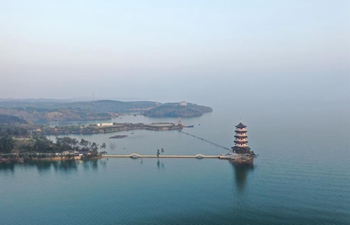by Burak Akinci, Wang Feng
VAN, Turkey, Nov. 29 (Xinhua) -- The pearl mullets, an endemic kind of fish species found only in the highly carbonated and salty waters of Lake Van in eastern Turkey, seems to have been saved from extinction by efforts of local residents and the government.
The pearl mullets, or inci Kefali in Turkish, have been brought back from the brink of disappearance caused by over fishing during the breeding season, a loss that would have a big impact on the region's culture.
"In the past years, the pearl mullets have been over caught and illegal fished, but nowadays, with strict regulations, the number of fish has increased," Necmettin Akdeniz, a seasoned fisherman, told Xinhua on one of his early morning fishing trips.
The only kind of fish in the lake is the livelihood of thousands of fisherman and families in the region.
The pearl mullets are unique to the area. Each year, a festival is organized in June to celebrate the migration of them which are found nowhere else in the world.
"In the last three to five years, this kind of fish has been saved," said Akdeniz, but cautioning that over fishing still exists despite severe fines and regulations.
"It will serve nothing to fish hundreds of kilos or even a ton a day of the fish, because if you can't sell it, it will rot somewhere. So it's better to fish what you need so that the fish can survive," he added.
Spring heralds the migration of the pearl mullets living in the lake but they cannot reproduce there because of the salinity of the water, so they migrate to the lake's tributaries to spawn.
A pearl mullet is approximately 20-21 centimeters in length. To overcome rapids, they try to jump four times higher than their size.
Female ones will lay eggs and the male ones will follow them to leave milt, and then the baby fish will be born in a week. They will afterwards return to Lake Van within a month.
Local residents used to see the spawning period as a prime time for fishing and quick money, snapping up the pearl mullets and causing the number of them to dwindle rapidly over the years.
Raising awareness among locals, joint government and private efforts have yielded results. The average size of the pearl mullets have increased, and also the fishermen's incomes.
Experts have hailed the progress made on preserving the pearl mullets, a trademark of the historic city of Van.
Mustafa Akkus, a scholar from the Faculty of Aquaculture of Van University, told Xinhua that the pearl mullets, which have been living in extreme conditions of Lake Van for the past 800,000 years, are an important source of income for the local residents.
"For us, to protect such income, we should prevent illegal fishing during the breeding period of April-July in the rivers that empty into the lake. If we prevent illegal fishing, we will have an opportunity to use this source in a sustainable way forever," said Akkus.
Akkus pointed out that protective measures against illegal fishing had been "very successful" this year.
"The pearl mullets have become a success story and is at the center of ecotourism" in Van, located in an underdeveloped region.
According to scientists, besides the pearl mullets, there is no significant aquatic life in the brackish waters of the lake.
But according to tales, legends and testimony of witnesses, there is also a monster lurking here, an urban myth that has attracted tourists and documentarians to this region.
The monster was not reported until 1995, but there are now hundreds of people claiming to have witnessed it, which is described as 15-meter long dinosaur-like animal.
No official scientific confirmation has been made despite several investigations.
However, Akdeniz said that he saw it a couple of years ago.
"Oh, I definitely saw it with my own eyes. It was an early morning and it was standing some 3 km away from my boat and its head was sticking two meters high above the water. The monster is real," he insisted.
(Xinhua reporter Umut Ozlu in Ankara also contributed to the story.)

















